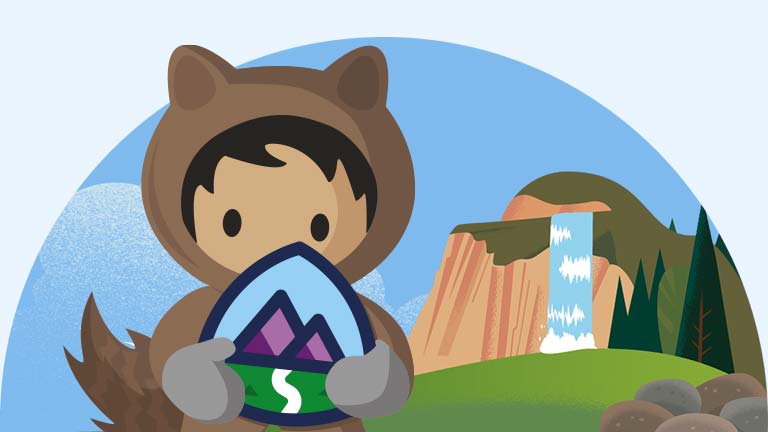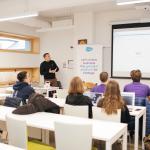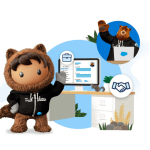Ramadan is a special month in the Islamic calendar, and it is observed by approximately 1.9 billion Muslims around the world.
It is a time for spiritual reflection, self-improvement, and community building. During this month, Muslims fast from dawn to dusk – with no food or water.
We asked some of our Muslim colleagues for their insights and reflections on what Ramadan means to them. We also asked non-Muslim colleagues who fasted for a day as part of the #SalesforceRamadanChallenge to share their experiences.
Ifrah Ali – Community & Charity

Ramadan for me is a time of reflection, gratitude, and generosity. It’s a month-long journey of self-improvement and spiritual growth, and a chance to connect with my community and give back to those in need.
One of the key themes of Ramadan is charity. Muslims are encouraged to give to those in need, whether through donating money, volunteering time, or simply offering kind words and support.
This emphasis on giving reflects the Islamic belief that wealth is a blessing that should be shared with others. But charity in Ramadan isn’t just about giving to those who are less fortunate. It’s also about strengthening our communities and building relationships with those around us. By volunteering at a local food bank, organizing a clothing drive, or simply reaching out to a neighbour in need, we can make a tangible difference in the lives of those around us and foster a sense of connection and compassion.
Ultimately, community and charity go hand in hand in Ramadan. By giving back to our communities and those in need, we can strengthen the bonds that connect us and make a positive impact in the world.
Samantha Williams – My First Fast
I almost immediately failed at the Ramadan Challenge as I woke up and automatically went to grab my water bottle as per my usual morning routine. I should have done what was suggested and woken up before sunrise to eat, but my snooze button was working, and I’m really not a morning person. Throughout the day I have mainly regretted this.

As a non-Muslim, taking on a one-day Ramadan Challenge has been a challenge, but also an insightful experience. I really do take for granted the everyday pleasures of food and water, but after further research, I have discovered more about Ramadan that I never knew. It’s not so much about the food and water, but more about self-reflection.
After chatting to some friends and my housemate about the challenge I discovered there is a food market near my house that comes alive at sunset for the Muslim community to enjoy as they break their fast. I am excited to check this at sunset out as I complete the challenge!
Roddy Alexander – My Second Fast

This is the 2nd year that I have taken part in the Ramadan Challenge after being challenged by my friend Zubair Salim last year. I have many Muslim friends and have previously had Muslim housemates so was aware of how special a time Ramadan was and how central fasting was to this. It seemed like a great opportunity to get an insight into how it felt to have no food or water and the challenges that this brings.
I think last year I was naive as to how difficult it would be. The hunger was pretty bad but the lack of water was definitely the hardest part. I found it difficult to concentrate in the afternoon and had a real lack of energy. It definitely made me appreciate how difficult it must be for Muslim colleagues during Ramadan to focus on work.
I know that Ramadan is also a time for gratitude and generosity and this challenge has definitely helped me focus on that. It makes you realise how lucky we are to have ready access to food and water and that other people aren’t as lucky. This challenge has motivated me to donate to a local charity that provides food to the homeless.
Mohsen Shakoor – Reflection
I put particular emphasis on reflection during the month of Ramadan, and this year I have been able to ramp that up massively by spending most nights at the mosque to perform Tarawih.
Tarawih is a special prayer during the month of Ramadan performed after the obligatory evening prayer known as Isha. It is a voluntary prayer that consists of 20 units of prayer (rak’ah) that are typically performed in congregation in the mosque.

For my mosque in Glasgow, it starts at 10 p.m. and finishes at around 11.30 p.m. with hundreds of Muslims of all backgrounds standing shoulder to shoulder.
Like many of you, my life is busy – work, family (including a 6-month-old baby) and everything else. Carving out this time after wrapping up each day has really allowed me to reflect on my spiritual well-being and strengthen my connection with God. As a result, I feel happier, I develop a deeper appreciation for the blessings in my life and am more self-aware.
Reflection in Islam also encourages empathy and compassion towards others. We are encouraged to reflect on the struggles and hardships of others and to seek ways to help and support those in need.
Stephen Johnston – Ramadan, Easter and Passover Together

I have always been inspired by the discipline and devotion of my Muslim colleagues and friends during Ramadan and it’s been great this year to join in with the Ramadan Challenge and to spend a day in reflection.
This year has particular significance as during April we have the convergence of Ramadan, Passover, and Easter all within the same month.
What a great reminder of what we do have in common and the importance of celebrating our differences while finding unity in diversity!
For many of us, this month is a time of reflection, a time to be thankful and to connect with others and what an amazing opportunity this year to do it across religious boundaries. My encouragement for each of us, regardless of background, is to take the time this month to ask others about how they celebrate their traditions and to see what we can learn from each other.
Shaukat Desai – Discipline
As a Muslim, preparing for Ramadan involves mental and spiritual preparation, such as daily and nightly prayers and engaging in acts of charity, to become more connected to my faith. During the month, my circadian clock changes due to different sleep and eating times, which can be challenging at times. However, I have found that this change can lead to increased focus and productivity.

One of the most important aspects of Ramadan for me is being disciplined with time management. Balancing work, family commitments, and spiritual needs can be challenging, but I focus on planning each day to make the most out of this month. I work out the number of hours I need to sleep, so I’m fully rested. I also incorporate meditation and prayers into my working day and also make time for volunteering on the weekends. This requires discipline and focus, as well as time and energy management.
In addition to work and personal commitments, I also make sure to spend quality time with my family during Ramadan. I plan activities to bring us closer together and to share the joy of breaking the fast together. This not only strengthens our family bond but also reminds us of the importance of community.
Overall, for me, Ramadan is a month of self-reflection, discipline, and connection with others. By fasting and focusing on spiritual and mental growth, I strive to become a better individual and contribute positively to my family and community. By managing my time wisely and staying disciplined, I am able to make the most out of this month and deepen my connection to my faith.
Alekhya Bodingari – Mindfulness

This is my first time doing the Ramadan challenge. I took it up as the names suggest to “challenge” myself and see if I can endure the self-restraint and experience what 2 billion people in the world go through every year. But after speaking with my Muslim friends and colleagues, I understand Ramadan is more about reflection and generosity and about being closer to God and oneself. So I started my challenge determined to practice good thoughts and pause at five points in the day to meditate.
Starting my day with prayer and meditation helped me set the intention for the day, contemplate why I was doing the challenge, and remove any limiting thoughts I had. The day of my fast was a working day. My day was filled with work meetings which moved my focus away from thinking about the challenge. But I had an alarm set for the five prayer times – Fajr, Zuhr, Asr, Maghrib, and Isha. If not at the exact minute, I took time to step away from my desk to breathe and reflect on my intention. This not only helped in bringing my focus back to the challenge and practising positive thoughts but also in boosting my energy and relaxing my mind. I hope to add the practice of three self-reflection points to my daily routine going forward.
Being mindful also helped me with endurance. Twelve hours into the fast, I developed headaches due to the lack of water. I stepped outside to take a little walk by the river. I shifted my focus away from the pain to my surroundings. The fresh air and light physical activity helped relieve the headache. Doing the challenge helped me to be much more present, and self-aware, and appreciate the fact that you can accomplish anything if you set your mind to it.
Cultivate Equality at Work
Reflect on the value of diversity and inclusion at work and what you can do to promote equality.

























